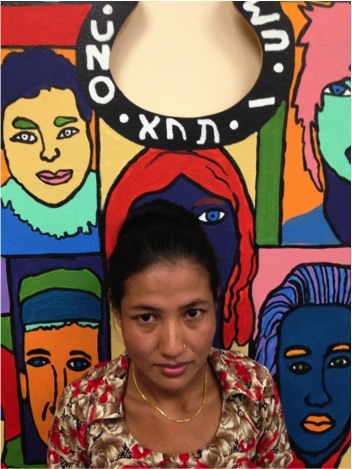#for my daughters
Passang Chauwan was born in the western half of Bhutan, but at the age of eight she moved to a refugee camp in Nepal where she remained for over 20 years, “In Nepal, we sat in a small house, and had a difficult life in camp.” In the refugee camp, she went to school because only single women were allowed to attend. “If women were married, they could not go to school; they had to stay with the children.”
After 20 years of living in the refugee camp in Nepal, Passang resettled as a refugee in the Unites States with her two daughters, husband and mother-in-law. The refugee resettlement process was not easy.
“It was different from when we left Bhutan to go to Nepal. The United States government had a process for refugees, which involved a form that took two years to get approved. Each family at the camp had different problems. The form asked why we left Bhutan to go to the United States and questions like that.”
On February 12, 2012, Passang left Nepal for the United States with her two daughters. “Yeah, we were worried about leaving our friends in the camp, but we knew we had family in the United States.” The trip from Nepal to the U.S. lasted two days and Passang was only able to bring a suitcase and a couple dresses. Through sponsorship from Dorcas International Institute of Rhode Island she settled into a Nepali community in South Providence.
“I am happy to reunite with my husband’s family [who came to Providence first]. I am happy I was able to come here to Providence. Some cases you don’t get any choices where you go so they did me a favor by letting me meet up with my husband’s family. We have a nice community now.”
Passang and her husband live in Providence, Rhode Island, with their twelve and seven year old daughters. “The community is nice and the neighborhood is good.” Passang jokingly said the only part of Providence she could do without is the snow. “The only difficulty is the snow. In my country (Nepal) we don’t have snow, only the mountains do.”
Passang works at Falvey Linen Supply and is also taking English classes in the morning at Dorcas International Institute. She also works “part-time at another job.” In addition to working and taking English classes, Passang takes care of her husband, her children, and her mother-in-law. Both of her daughters are full time students and have grown accustomed to American culture. Passang hopes that they will still hold on to the traditions the Nepalese have practiced for generations.
Initially Passang was nervous if her children would fit in to American culture. She hoped that they would enjoy school and make friends. “The first day of school they were crying, but after a week they were happy.” During her first days in Rhode Island, Passang felt welcomed by other Nepali refugee families who had moved here previously. The Nepali community is tightly connected and helps support one another.
“Each weekend we go to a different house and get together and discuss and ask questions to each other what is difficult for us in the United States and we try to help everyone out in our community…If somebody passed away, then maybe we get together and discuss how much money we need to raise and donate to the family. Also, we talk about citizenship in the United States. Some have no driver’s license, no car, and that’s difficult in our community.”
Passang is very happy to be in the United States and feels blessed to be out of the refugee camp. “I was born in Bhutan, grew up in Nepal, and now I am in America today. Now I have a story like this, the refugee. I have the life.”
Although Passang is happy to be in the United States, she still said, “I miss my family all in Nepal.” Her family still in Nepal includes her mother, sister, and brother. Unfortunately Passang’s mother is constantly sick and struggles with health problems and remains in a refugee camp. “My mom is always sick; she is in a Nepali refugee camp. My sister and my brother, everybody, is in the refugee camp, but they are all in the process [of coming here].”
Passang’s dream for the future is for her daughters to continue school and attend college. She helps her daughters with their school work and also provides financially for the family. “My big mission is for my two daughters. I will work long, and hard, and pay for good knowledge if they want, I will help them. That’s why I came to the United States”
Written and compiled by Alex Napoli, Matt McDermott and Briana Di Prizio
Post link

